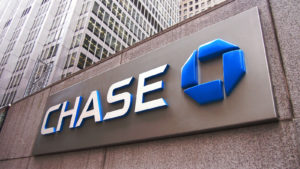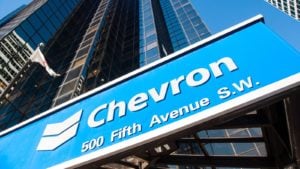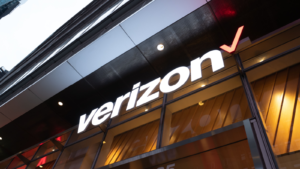Indeed, the macro and fundamental backdrop for stocks is very healthy. On the macro front, the April inflation report came in better than expected. Moreover, Federal Reserve Chairman Jerome Powell downplayed the possibility of a rate hike at a panel discussion in Amsterdam.
On the growth side, GDP growth is running above the historical trend. And as the Walmart report showed, the consumer is still resilient enough to support corporate profits. As earnings season ends, companies have exceeded expectations, providing the rationale for continued technical momentum.
Despite the hot market, you don’t want to chase expensive stocks since drawdowns can present substantial losses. These cheap Dow stocks provide a better risk-reward profile. All trade below 13 times forward earnings, a significant discount to the market.
JPMorgan Chase (JPM)

When investing in banks, you want the best-in-breed to avoid a Silicon Valley Bank scenario. JPMorgan Chase (NYSE:JPM) has the strongest balance sheet and peer-leading returns on equity. Furthermore, this “too big to fail” bank is run conservatively with a focus on risk management.
Q1 results once again revealed the strong underlying performance and fortress balance sheet. Net income grew 6% from $12.6 billion in Q1 of 2023 to $13.4 billion. Although net interest income declined 4% sequentially, other lines of business saw solid growth. In consumer and community banking, investment assets rose 25%.
One segment where growth could accelerate in coming quarters is investing banking. Revenues increased 27% to $2 billion, driven by higher equity and debt underwriting. As capital markets open up, this segment could see more growth.
JPMorgan continues to grow without comprising its balance sheet strength. It reported a solid CET1 capital ratio of 15.0%. Moreover, the bank retained an industry-leading total loss-absorbing capacity of $520 billion.
As of this writing, JPM stock is trading at a price-to-book ratio of 1.91. This premium is warranted considering its best-in-class return on tangible common equity of 21%. Still on a price-to-earnings multiple, JPMorgan ranks among the cheap Dow stocks at 12 times forward earnings.
Chevron (CVX)

Chevron (NYSE:CVX) has been in the headlines recently due to its controversial acquisition of Hess (NYSE:HES). Unfortunately, the deal is in limbo after Exxon Mobil’s (NYSE:XOM) suit related to Guyana assets, which poses a prolonged legal battle. Moreover, some Hess shareholders feel the deal doesn’t reflect the full value of the premium Guyana assets.
Amidst the uncertainty, this energy giant remains one of the cheap Dow stocks to buy. As of this writing, the stock trades at 11 times forward earnings. Even better, it has an impressive dividend track record and yields 4%. Plus, Chevron is a dividend aristocrat with 36 years of dividend growth, increasing its dividend by 6.33% annually over the past five years.
In addition to dividends, the company is returning capital to shareholders via buybacks. In Q1 of 2024, it executed $3 billion of share repurchases. Furthermore, it increased its annual buyback guidance to a range of $10 to $20 billion.
Due to management’s focus on growth, capital discipline and shareholder returns, CVX stock will move higher. The company expects 4% to 7% production growth in 2024, driven by strong execution in its diversified Permian portfolio. Lastly, the company is investing in energy sources of the future like renewable fuels and hydrogen.
Verizon Communications (VZ)

If you are looking for a steady, high-yield stock that’s also cheap, Verizon Communications (NYSE:VZ ) fits the bill. This telecommunication giant pays a 6.5% dividend, trades at a forward P/E of 8 and has a price-to-free cash flow of 9.
Verizon is one of the big three wireless carriers in the U.S. In the latest Q1 results, revenue grew by 0.3% year-over-year (YOY). A positive was the 3.3% growth in wireless service revenue to $19.5 billion. This growth was in line with management’s target of 2% to 3.5%.
Also, profitability improved from the prior year quarter. Consolidated adjusted EBITDA increased from $11.9 billion to $12.1 billion. Additionally, free cash flow was stronger, hitting $2.7 billion compared to $2.3 billion in Q1 2023.
Lastly, one of the biggest drivers for VZ stock will be its debt paydown progress. Management expects a lower capital intensity in C-Band built out to reduce capex by $1.5 billion in 2024. Therefore, it will likely exceed the $18.7 billion in free cash flow it generated in 2023, allowing it to reduce unsecured debt.
Verizon’s free cash flow generation puts it on the cheap Dow stocks list. Expect gains as it progresses on its debt repayment efforts and increases its dividend for the 18th consecutive year.
On the date of publication, Charles Munyi did not hold (either directly or indirectly) any positions in the securities mentioned in this article. The opinions expressed in this article are those of the writer, subject to the InvestorPlace.com Publishing Guidelines.
Charles Munyi has extensive writing experience in various industries, including personal finance, insurance, technology, wealth management and stock investing. He has written for a wide variety of financial websites including Benzinga, The Balance and Investopedia.
